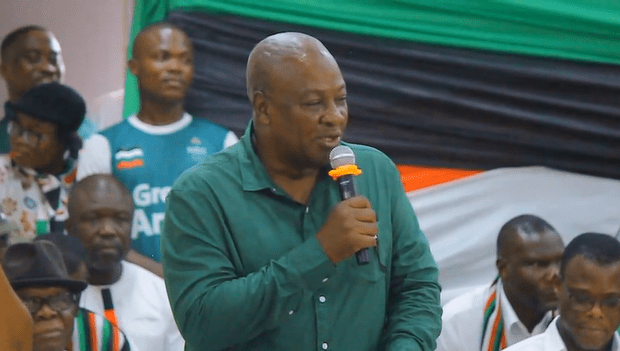Special aide to former President John Dramani Mahama, Joyce Bawah Mogtari, has accused the New Patriotic Party (NPP) of orchestrating a hate campaign that ultimately led to the electoral defeat of the National Democratic Congress (NDC) in the 2016 elections.
Mogtari’s accusations struck at the heart of the contentious issue of the energy crisis, colloquially referred to as “dumsor,” which plagued the nation during Mahama’s tenure and still prevalent.
With a tone of frustration and disbelief, she recounted the relentless efforts of Mahama to mitigate the crisis, often sacrificing sleep to engage in urgent discussions and search for viable solutions.
Mogtari expressed deep disappointment in the lack of reciprocal efforts from the NPP, emphasizing that instead of offering constructive ideas or support, they actively propagated a campaign of hatred against Mahama and the NDC.
She questioned the sincerity of the NPP’s purported expertise in energy matters, highlighting a distinct absence of tangible solutions or offers of assistance.
“When “dumsor” came, John Mahama felt so responsible, I remember every morning there were phone calls, he was looking for people to help, not once for all the expertise that our present owners of government claim to have did you ever hear that any energy expert from the fold of NPP woke up in the morning and said Mr Mahama I have this solution, I can help you with wind turbines that will improve the systems, no. They carried out a hatred campaign and caused the nation to rise against a man who spent sleepless nights trying to find solutions to our problems,” she lamented to Nana Yaa Brefo and Isaac Ekow JB during an interview at Onua FM on March 14.
Mogtari passionately recalled Mahama’s advocacy for sustainable energy solutions, particularly his promotion of solar power initiatives aimed at reducing reliance on the national grid. She lamented the NPP’s failure to embrace these initiatives, attributing it to their partisan agenda rather than genuine concern for the nation’s welfare.
“John Mahama introduced Solar for example and even advocated for people who were using solar power to be able to get our off times from the national grid and that if you go on solar, for example, your bills will be lower, that was a fantastic policy, how did our opponents at the time support it?” she quizzed.
One of the pivotal points raised by Mogtari was Mahama’s strategic engagement with Independent Power Producers (IPPs) to address the energy deficit. She underscored the significance of this approach in diversifying the energy mix and ensuring a more resilient and reliable power supply for the nation. Mogtari praised Mahama’s foresight in recognizing the need for innovative solutions to overcome the challenges posed by the energy crisis.
“Then we came down to the very crippling crisis, what were we supposed to do? We had never secured the services of Independent Power Producers, it hadn’t even come to mind.
“John Mahama with his council critically noticed that if a sustainable solution wasn’t introduced, we wouldn’t be able to experience nor use electricity again. So, the IPPs augmented the national grid, and we bypassed hydro which was what we largely depended on,” she stated.
Furthermore, Mogtari emphasized that the NDC has a more holistic understanding of the environmental and climatic factors that affect energy production hence the reason the NDC was pragmatic during the “dumsor” that occurred under former President John Agyekum Kufour’s regime although the NDC unfortunately were not lent the same hand in 2016.
“Dumsor had absolutely nothing to do with Mahama or the NDC, climate change had happened under President Kufour if you would remember, we had very senior most pastors who went to the Akosombo Dam to call on the good Lord to let it rain, how did we criticise Kufour?,” she quizzed.
“At the time the NDC understood that Kufour and the NPP were going through a crisis that nature was naturally punishing us for how we were polluting our water bodies and that the rain patterns were changing due to climate change, so it was important for us to think about sustainable power generation,” she said.
By Lois Dogbe


